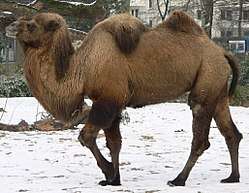olfend
Middle English
Old English

olfend (Camelus bactrianus)
olfend (Camelus dromedarius)
Alternative forms
- olfenda
Etymology
From Proto-Germanic *ulbanduz (“camel”) (see also Proto-Germanic *elpanduz (“elephant, camel”)) from Latin elephantus. Cognate with Old Saxon olbundeo (“camel”), Old High German olpenta (“camel”), Old Norse úlfaldi (“camel”), Gothic 𐌿𐌻𐌱𐌰𐌽𐌳𐌿𐍃 (ulbandus, “camel”). Compare also Old English elpend (“elephant”).
Pronunciation
- IPA(key): /ˈol.fend/, [ˈoɫ.vend]
Noun
olfend m
- camel
- Hē rād on olfende ġeond þā wēstenne.
- He rode on a camel through the desert.
- Fēower and hundnigontiġ on hunde olfenda habbaþ ānne hofor, and þā ōðre habbaþ twēġen.
- Ninety-four percent of camels have one hump, and the rest have two.
- Ēaðre is olfende tō gānne þurh nǣdle ēaġe þanne se welega on Godes rīċe gā.
- It is easier for a camel to go through the eye of a needle than for a rich person to enter the Kingdom of God.
Declension
Declension of olfend (strong a-stem)
| Case | Singular | Plural |
|---|---|---|
| nominative | olfend | olfendas |
| accusative | olfend | olfendas |
| genitive | olfendes | olfenda |
| dative | olfende | olfendum |
Related terms
This article is issued from
Wiktionary.
The text is licensed under Creative
Commons - Attribution - Sharealike.
Additional terms may apply for the media files.